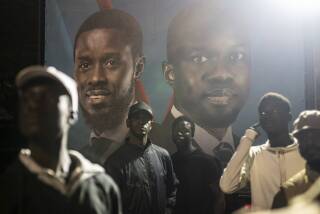Egypt voters turn out for second day of elections
Throngs of Egyptians voted for a second day Tuesday in parliamentary elections that were surprisingly peaceful, as the country appeared excited and determined to fulfill the so far elusive promises of the revolution that toppled Hosni Mubarak.
Lines snaked and last-minute campaigning echoed across nine governorates as the first round of a multistage vote drew what Abdel-Moez Ibrahim, head of the election commission, called a “massive and unexpected turnout.”
After months of protests and anger over military rule, Egyptians were defiant in stamping their imprints on ballots and on the nation’s fate. The election took place as protests in Cairo’s Tahrir Square dwindled and voters focused on the deeper questions of selecting a 498-seat parliament that would write a constitution and usher in a post-Mubarak political era.
The Egyptian Council for Human Rights reported Tuesday that it had received 964 complaints of voting irregularities. A majority of the grievances involved polls opening late and illegal campaigning outside voting stations, most notably by the Muslim Brotherhood’s Freedom and Justice Party and the ultraconservative Islamist Salafi party Al Nour.
“This is the first time in Egypt’s history where we hold proper elections. Minor violations and organizing errors are acceptable because we are all still learning the electoral process,” said Hassan Ibrahim, a 41-year-old barber who skipped work Tuesday to vote.
Islamists are expected to win a major share of seats in parliament. Mamdouh Ismail, a candidate for Al Nour, predicted that the new assembly would consist mainly of “Islamists and real national” powers. Such talk was prevalent in mosques in recent weeks and points to the intensifying struggle between Islamists and secularists over the country’s future.
Fearing Islamists will dominate the new assembly, many Egyptians voted for the secular Egyptian Bloc, a coalition of parties headed by Naguib Sawiris’ Free Egyptians Party. Sawiris is a Coptic Christian and a billionaire telecommunications mogul who has called for Western-style free markets and a separation of religion and state.
“I voted for the [Egyptian] Bloc although I’m not 100% in favor of their ideology, but we need to balance the next parliament,” said Osama Sayed, 52, who was at a polling station in east Cairo. “An absolute majority of Islamists would create a tyrant parliament like those during Mubarak’s days, where National Democratic Party members dominated everything.”
A few thousand demonstrators in Tahrir Square boycotted the elections, claiming the new parliament would bring little change and be subservient to the ruling Supreme Council of Armed Forces. The military council has refused to hand power to a democratic government until a president is elected in June.
Voters, nonetheless, were eager to have their say, marking ballots covered in symbols representing dozens of parties.
“Tahrir protesters have legitimate demands but elections are a different matter,” Magued Mohamed Abdel Aziz said moments after voting. “A new parliament will be chosen anyway and that’s what the revolution has been calling for, so by not voting they’re giving up on a right that we all fought for.”
He added: “I’m 52 years old and I never even thought of voting throughout my whole life. This time, I’m here because I know that my voice will be heard for once and I’m enjoying it.”
Ibrahim, the election committee head, said results for individual candidates in governorates, including Cairo and Alexandria, would be announced Wednesday. The results for candidates running on party lists will not be announced until the third and final stage of the voting in January.
Many of the country’s 50 million eligible voters have complained that the drawn-out elections are confusing. But turnout is likely to be much higher than during Mubarak’s three-decade regime, when millions of Egyptians stayed away from elections that were shadowed by thugs and widely seen as rigged in favor of the ruling party.
Hassan is a news assistant in The Times’ Cairo bureau.
More to Read
Start your day right
Sign up for Essential California for news, features and recommendations from the L.A. Times and beyond in your inbox six days a week.
You may occasionally receive promotional content from the Los Angeles Times.







